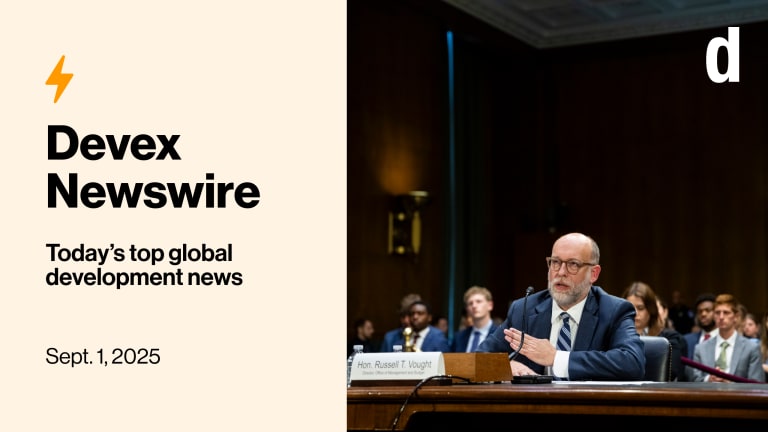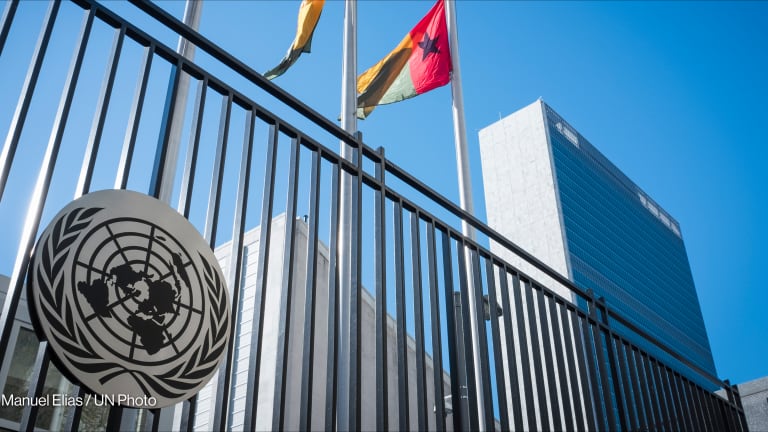Presented by International Monetary Fund

The notion of promoting democracy abroad went into high-gear under a Republican president. Its breakdown happened under one, too.
Also in today’s edition: A top former U.N. official blasts the U.S.- and Israel-backed plan to deliver food to Gaza.
+ Happening today at 12 p.m. ET: Can multilateral development banks save global development? Join Vera Songwe, Homi Kharas, Rick Samans, and Raj Kumar to explore why MDBs are now vital, their unique leverage, and the urgent reforms needed to unlock massive climate finance. Get the insights on where funding is headed. Save your spot now. This event is part of our Road to Sevilla series in the lead-up to FfD4.
NED reckoning
This is a preview of Newswire
Sign up to this newsletter for an inside look at the biggest stories in global development, in your inbox daily.
“I believe the renewed strength of the democratic movement, complemented by a global campaign for freedom, will strengthen the prospects for arms control and a world at peace.”
Those were the words of former U.S. President Ronald Reagan in 1982 as the Cold War raged. A year later, the National Endowment for Democracy, or NED, was founded.
Today, NED is on life support, as are U.S. democracy efforts on the whole — victims of the Trump administration’s purge of USAID.
From the outset of that purge, every program in the country’s global election monitoring system was canceled. NED funding was blocked. The U.S. Agency for Global Media, which promotes independent journalism, was deemed “unnecessary.”
Even the International Republican Institute, a GOP-backed group once championed by U.S. Secretary of State Marco Rubio, has been left hanging by a thread, my colleague Elissa Miolene writes.
As with many things, Rubio apparently changed his mind about programs like IRI. “When you’ve been promoting democracy in some society for 20 years and have made no advances, you have to ask yourself, at least at a minimum, are we spending money on the right thing, with the right people, and in the right way?” he said at a recent congressional hearing.
Rubio is far from alone in articulating that frustration. Tim Meisburger, USAID’s former director of democracy and governance under Trump’s first term, is another critic, accusing NED of discriminating against Republicans and conservatives in its hiring practices and arguing that the organization is duplicative and should be defunded.
While some Republicans welcomed the elimination of U.S. democracy programs, the news was also greeted with glee by leaders whose democratic credentials are questionable, at best — bolstering the argument that the demise of democracy promotion efforts is a boon to autocrats.
For example, in the early days of USAID’s dismantling, Nayib Bukele, El Salvador’s strongman president, posted on the social media platform X: “Cutting this so-called aid isn’t just beneficial for the United States; it’s also a big win for the rest of the world.”
Read: How the US government let support for democracy unravel
Man with a plan
“It’s absolutely egregious.”
— Martin Griffiths, former U.N. emergency relief coordinatorGriffiths, the former U.N. emergency relief coordinator, told the audience at the Devex CheckUp @ WHA78 summit on the sidelines of last week’s World Health Assembly that he wasn’t going to “mince words.”
And he didn’t. He railed against the Gaza Humanitarian Foundation, a U.S.- and Israel-backed effort to deliver food to Palestinians — a controversial scheme that critics say is meant to sideline traditional humanitarian organizations, including U.N. agencies.
Griffiths, speaking before GHF’s rollout on Monday — which was marred by chaos — suggested the “secured” distribution sites would effectively serve as a kind of military fortress.
“One of my principal objections is [that] you cannot gain trust between the deliverers of aid and the recipients on a military base,” he said. “It's kind of that simple. Anybody who’s been on humanitarian front-line operations knows that without trust, it doesn’t work, because you’re often drawing people into danger in order to get assistance; you’re putting your own staff in danger.”
The U.N., on the other hand, has a plan to massively ramp up humanitarian aid in Gaza if it is allowed to do so by Israel, he told us. That plan is designed to provide aid across the entire Gaza Strip and includes a monitoring system to address Israeli concerns about diversion of food to Hamas. The U.N. has more than 160,000 pallets of aid, enough to fill 8,900 trucks, a vast network of aid workers, and distribution sites.
The plan, Griffiths said, is a good example of why the U.N. is still “relevant.”
Read: Former UN relief chief says world body's reforms lack vision
+ Find here all the coverage and recordings of Devex CheckUp's journalist-led summit on the sidelines of WHA78.
Vote of confidence
“I just witnessed a marathon in Committee B,” Philippine Health Secretary and WHA78 President Teodoro Herbosa said Tuesday evening at the close of the assembly, which went over time as member states struggled to find consensus on the text of the first WHO global action plan on climate change and health. They ended up voting four times before eventually adopting it.
The plan identifies targets, objectives, and proposed actions for how the World Health Organization and its member states can address the health impacts of climate change and build climate-resilient health systems. But several countries argued that not enough consultations were made on the plan, and some argued that assessing the adequacy of climate financing is not within the remit of WHO.
Several member states from the eastern Mediterranean region wanted to delay the adoption of the plan for another year, but the majority rejected the idea, arguing that, given the urgency of the climate crisis, the plan should be adopted without delay.
Read: WHA passes first climate action plan after tense vote
State lines
The plan to merge USAID’s leftovers into the U.S. Department of State has generated more than its fair share of controversy. But, at least under the Trump administration, it looks like a done deal. So we decided to look at DOS’ current pool of implementers, which could provide insights into its priorities and procurements, my colleague Miguel Antonio Tamonan writes.
In 2024, DOS allocated $6.1 billion of its $18.6 billion obligations for development-related projects.
Our findings show that more than half of this, worth $3.9 billion, went to U.S.-based awardees, with the lion’s share going to nonprofits.
Read more: Who are the US State Department’s top development partners? (Pro)
+ Start Devex Pro with a 15-day free trial. Explore expert analyses, unlock hidden funding opportunities, connect with key players at exclusive events, and access a wealth of knowledge you won't find anywhere else.
Silver linings in Côte d’Ivoire
Tuesday’s opening ceremony at the annual meetings of the African Development Bank in Côte d’Ivoire felt more like a send-off for AfDB President Akinwumi Adesina, capping his decade at the helm. He racked up a laundry list of achievements: tripling the bank’s capital, providing inputs to 13 million farmers, and approving $2.5 billion for over 24,000 women-led businesses.
Heads of state lined up with praise, my colleague Ayenat Mersie, who’s on the ground, tells me. Niger Prime Minister Ali Mahaman Lamine Zeine credited AfDB for helping farmers grow rice in once-barren regions. Tanzania Vice President Philip Mpango lauded the bank’s infrastructure investments and announced that a major road in one of Tanzania’s top cities will be named after Adesina.
As leadership transitions loom, so do major challenges. The U.S. plans to withdraw $555 million from the African Development Fund — AfDB’s concessional financing arm serving the continent’s lowest-income countries.
“In today’s world, the only reliable ally you have is yourself,” said AfDB Senior Vice President Marie-Laure Akin-Olugbade.
That means tapping into African capital more effectively, through stronger value chains, mobilizing private investment for infrastructure, and pushing for debt reform. And there was another “R” word on everyone’s lips.
“We need to capitalize on remittances,” said Comoros President Azali Assoumani, noting that half of all Comorians live abroad. He’s working with AfDB to speed up transfers and explore ways to convert them into long-term investments.
One bold idea in the bank’s African Economic Outlook 2025 report, launched Tuesday, is a diaspora levy. The 2% tax on Africans in the U.S. alone could raise $800 million a year — ambitious, to say the least. Ayenat will take a closer look at the idea this week.
Related: Inside the race to lead the African Development Bank
+ Are you at the AfDB annual meetings — or have a tip about them? Reach out to Ayenat at ayenat.mersie@devex.com.
In other news
The Asian Infrastructure Investment Bank plans to open offices in Singapore and Hong Kong in an effort to expand its operations. [Bloomberg]
Global temperatures have an 80% chance of setting a new heat record in the next five years, with a strong likelihood of temporarily exceeding the 1.5 degrees Celsius pre-industrial benchmark, significantly increasing the risk of extreme weather events worldwide. [The Guardian]
The Gaza Humanitarian Foundation’s aid distribution on Tuesday was overwhelmed by Palestinians seeking food packages following Israel’s 11-week blockade. [Reuters]
Sign up to Newswire for an inside look at the biggest stories in global development.








